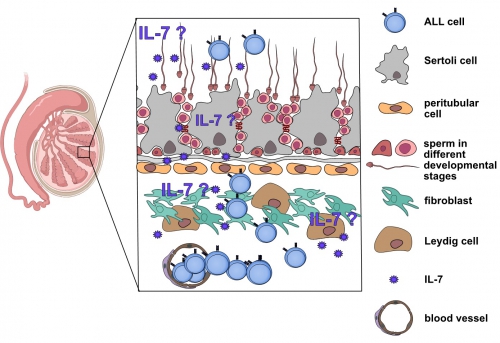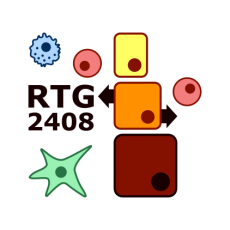Vladyslava Dovhan

Vladyslava Dovhan
P14-2: Interleukin-7 dependent infiltration of acute lymphoblastic leukemia across the testicular endothelial barrier
|
PhD Student Co-supervisor
Co-supervisor |
Leukemia is a malignant disease of the hematopoietic system which is characterized by the uncontrolled proliferation of white blood cells. In children, acute lymphoblastic leukemia (ALL) is most common. Although optimized treatment regimens improved the prognosis for ALL in recent years, relapses still occur. The vast majority of extramedullary (i.e., non-bone marrow) relapses of pediatric ALL involve the central nervous system and testes. In the case of testicular relapse, testis removal or high-dose radiation therapy is often recommended. These treatments can lead to infertility and impaired physical development. Therefore, less invasive treatment options are urgently needed. For their development, we need to better understand the cellular interactions that contribute to the testicular infiltration of ALL cells. We hypothesize that the settlement and/or maintenance of ALL cells in the testis is promoted by local production of interleukin-7 (IL-7). This hypothesis is based, firstly, on the fact that the IL7/IL-7 receptor (IL-7R) signaling pathway plays a role in ALL pathogenesis, extramedullary infiltration in the central nervous system and contributes to a higher relapse risk. Secondly, we observed high levels of IL-7 production in the mouse testis. To date, the role of local IL-7 in testicular relapse has not been investigated, although IL-7 production in the human testis has been demonstrated in several studies. In this project, we aim to determine time and source of IL-7 production in the testis as well as its role in testicular infiltration of leukemia. Using conditional knockout mice, we will investigate how IL-7 production in the testis affects testicular homing, proliferation, metabolism and chemoresistance of ALL cells. With the help of this project we aim to develop novel, more specific and less invasive therapies for testicular ALL involvement and prevention of testicular relapse. This project was led by Prof. Dr. Denis Schewe until 04/2024.
Testicular homing and/or maintenance of ALL cells may be sustained due to IL-7 production by testis cells: sperm cells, Sertoli cells, Leydig cells, fibroblasts etc. The aim of the project is to determine the source and role of the local IL-7 production in testis for testicular leukemia. |
Photos: by UMMD, Melitta Schubert/Sarah Kossmann









